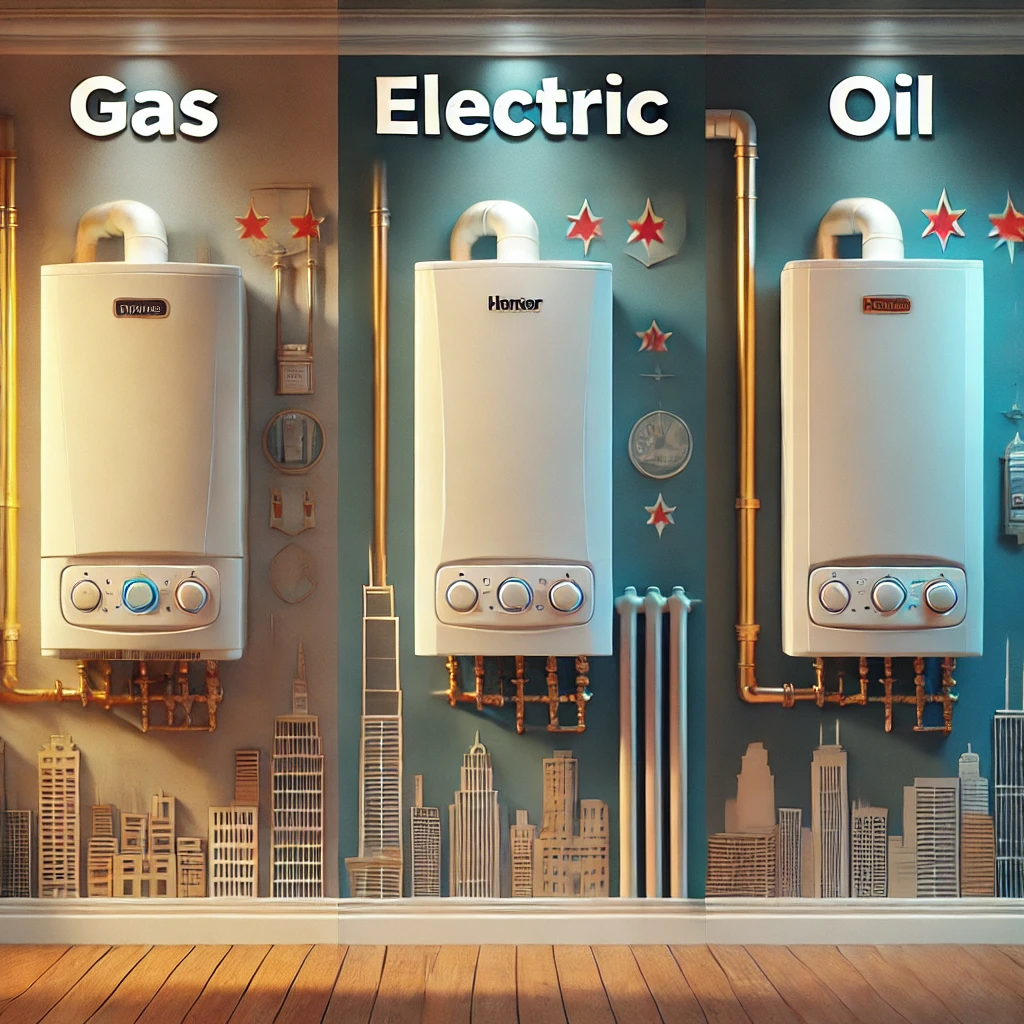Considering Boiler Installation in Chicago? Here’s What You Need to Know First
Boiler installation is a big decision, especially in Chicago, where winter temperatures can drop well below freezing. A reliable, efficient boiler can be the backbone of your home’s heating system, providing consistent warmth when you need it most. Whether you’re installing a new boiler or replacing an old one, there are several important factors to…
Boiler installation is a big decision, especially in Chicago, where winter temperatures can drop well below freezing. A reliable, efficient boiler can be the backbone of your home’s heating system, providing consistent warmth when you need it most. Whether you’re installing a new boiler or replacing an old one, there are several important factors to consider ensuring you’re making the best investment for your home, budget, and comfort. This guide covers everything you need to know about boiler installation in Chicago, from choosing the right type of boiler to understanding local regulations and maximizing energy efficiency.
1. Know the Basics: Types of Boilers Available
Before making any decisions, it’s essential to understand the types of boilers available:
- Gas Boilers: Powered by natural gas, these boilers are popular for their energy efficiency and cost-effectiveness. They’re commonly used in Chicago and tend to work well in larger homes.
- Oil Boilers: Oil boilers are less common in urban areas due to storage requirements, but they may be an option in suburban or rural locations.
- Electric Boilers: Electric boilers are generally smaller, making them ideal for apartments or smaller homes. However, they tend to be more costly to operate than gas boilers.
- Condensing Boilers: Known for high efficiency, condensing boilers capture additional heat by condensing exhaust gases, saving energy. These are a great option for anyone looking to maximize efficiency.
Tip: In Chicago, gas boilers are a popular choice due to access to natural gas, but every home is unique. Consulting a professional installer can help you decide which boiler type suits your home best.

2. Understanding Efficiency Ratings (AFUE)
The efficiency of a boiler is measured by its Annual Fuel Utilization Efficiency (AFUE) rating. This rating tells you how much energy the boiler converts into heat. For example, a boiler with a 90% AFUE rating converts 90% of its energy into heat, with 10% lost in the process.
- Why It Matters: Choosing a high-efficiency boiler can lead to lower energy bills, especially during Chicago’s long heating season. Many newer models offer AFUE ratings of 90% or higher, which can result in significant energy savings over time.
Quick Fact: In Chicago, energy-efficient boilers with higher AFUE ratings often qualify for rebates or tax incentives, helping reduce the upfront costs of installation.

3. Consider the Boiler Size and Capacity
Boilers come in different sizes and capacities, and choosing the right one for your home is crucial. A boiler that’s too small won’t heat your home efficiently, while one that’s too large will consume excess energy.
- BTU Requirement: The heating capacity of a boiler is measured in British Thermal Units (BTUs). A professional installer will calculate the BTUs needed based on your home’s size, insulation, windows, and Chicago’s climate.
- Load Calculations: The installer should conduct a “Manual J” load calculation, which takes into account your home’s specific heating needs.
Pro Tip: Don’t guess when it comes to boiler size; a proper load calculation is essential to getting the right fit. An oversized or undersized boiler can lead to wasted energy and inconsistent heating.

4. Evaluate the Installation Costs
Boiler installation costs can vary widely depending on the type, size, and complexity of the installation. In Chicago, boiler installation can range from $3,500 to over $8,000, depending on your home’s requirements.
- Factors Affecting Cost: Variables such as labor, permits, the type of boiler, and any additional modifications to the heating system will impact the cost.
- Permits: In Chicago, you’ll need permits for new installations, and certain installations may need inspections to ensure they meet local safety codes.
Tip: Get quotes from multiple contractors to compare prices and services. Keep in mind that quality installation is key to boiler performance, so prioritize professional expertise over the lowest price.
5. Find a Qualified, Local Installer
Choosing a reputable and experienced installer is essential for safe and efficient boiler operation. In Chicago, where weather conditions are harsh, a skilled installer can make a significant difference in how well your boiler performs.
- Research: Look for licensed and insured installers with positive customer reviews. Local experience is a plus, as they’ll understand the unique heating needs of Chicago homes.
- Get Recommendations: Ask for recommendations from friends or family, or check platforms like Google and Yelp to find highly-rated installers.
Why It Matters: A trusted installer ensures that the job is done correctly, reducing the risk of costly repairs and improving the overall longevity of your boiler.
6. Understand Maintenance Needs
Regular maintenance is essential to keep your boiler running efficiently and safely. A well-maintained boiler will provide consistent heat and can last up to 15 years or more.
- Annual Inspections: Schedule an annual inspection to keep your boiler in top condition, especially before Chicago’s winter season.
- Cleaning: Regular cleaning helps remove any dirt or sediment that can accumulate in the boiler, which can cause inefficiencies or malfunctions.
- Safety Checks: Regular maintenance includes checking for any gas or carbon monoxide leaks, ensuring your family’s safety.
Tip: Many companies offer service plans, which can make maintenance more affordable and ensure you stay on schedule with yearly tune-ups.
7. Consider the Long-Term Savings
While boilers can have a higher upfront cost compared to other heating options, the long-term savings can be substantial. High-efficiency boilers save on energy costs over time, and they are known for their durability and longevity.
- Energy Savings: Boilers tend to use less energy than furnaces for heating because they operate more efficiently.
- Durability: Boilers generally last longer than furnaces, meaning you won’t have to worry about frequent replacements.
Quick Fact: Investing in a high-efficiency boiler may qualify you for rebates from local utility companies in Chicago, which can offset the initial cost of installation.
8. Consider Environmental Impact
Many homeowners are opting for energy-efficient boilers to reduce their environmental footprint. High-efficiency boilers produce fewer emissions, which is a plus for eco-conscious homeowners in Chicago.
- Lower Emissions: Boilers that operate with higher AFUE ratings release fewer pollutants.
- Sustainable Options: Some modern boilers are designed to work with renewable energy sources, which can reduce reliance on fossil fuels.
Why It Matters: Choosing an eco-friendly boiler not only reduces energy costs but also contributes to a more sustainable future.
9. Take Advantage of Financing and Incentives
If you’re concerned about the cost, check out financing options and incentives available in Chicago. Many installers offer financing plans to make the upfront cost more manageable.
- Local Rebates: Check with local utility companies like Peoples Gas or ComEd for rebates on high-efficiency boiler installations.
- Federal Tax Credits: There may be federal tax credits available for energy-efficient home upgrades, which can further reduce the cost.
Tip: Ask your installer about any available incentives, and look into financing options to spread out the investment over time.
10. Prepare for Chicago’s Cold Winters with a Reliable Heating Source
In Chicago, a high-performing boiler can be the difference between comfort and discomfort during brutal winter months. By choosing a quality boiler, you’ll ensure that your home remains cozy even when the temperatures dip below zero.
- Consistent Heating: Unlike forced air systems, boilers provide radiant heat that can offer a more consistent, comfortable warmth.
- Reliability: A new boiler installed by a skilled professional will be ready to handle Chicago’s toughest weather conditions.
Final Thought: With proper planning and installation, your boiler will be a powerful ally against Chicago’s cold winters, keeping your home warm, energy bills low, and maintenance hassle-free.
Conclusion
Installing a new boiler in Chicago is a significant investment, but with the right planning, you can make the most of it. From understanding the types of boilers available to choosing the right size and installer, these factors will ensure your boiler performs efficiently and keeps your home warm through the toughest winter days. By prioritizing energy efficiency, proper maintenance, and expert installation, you’ll enjoy the warmth, reliability, and savings that a high-quality boiler offers.

